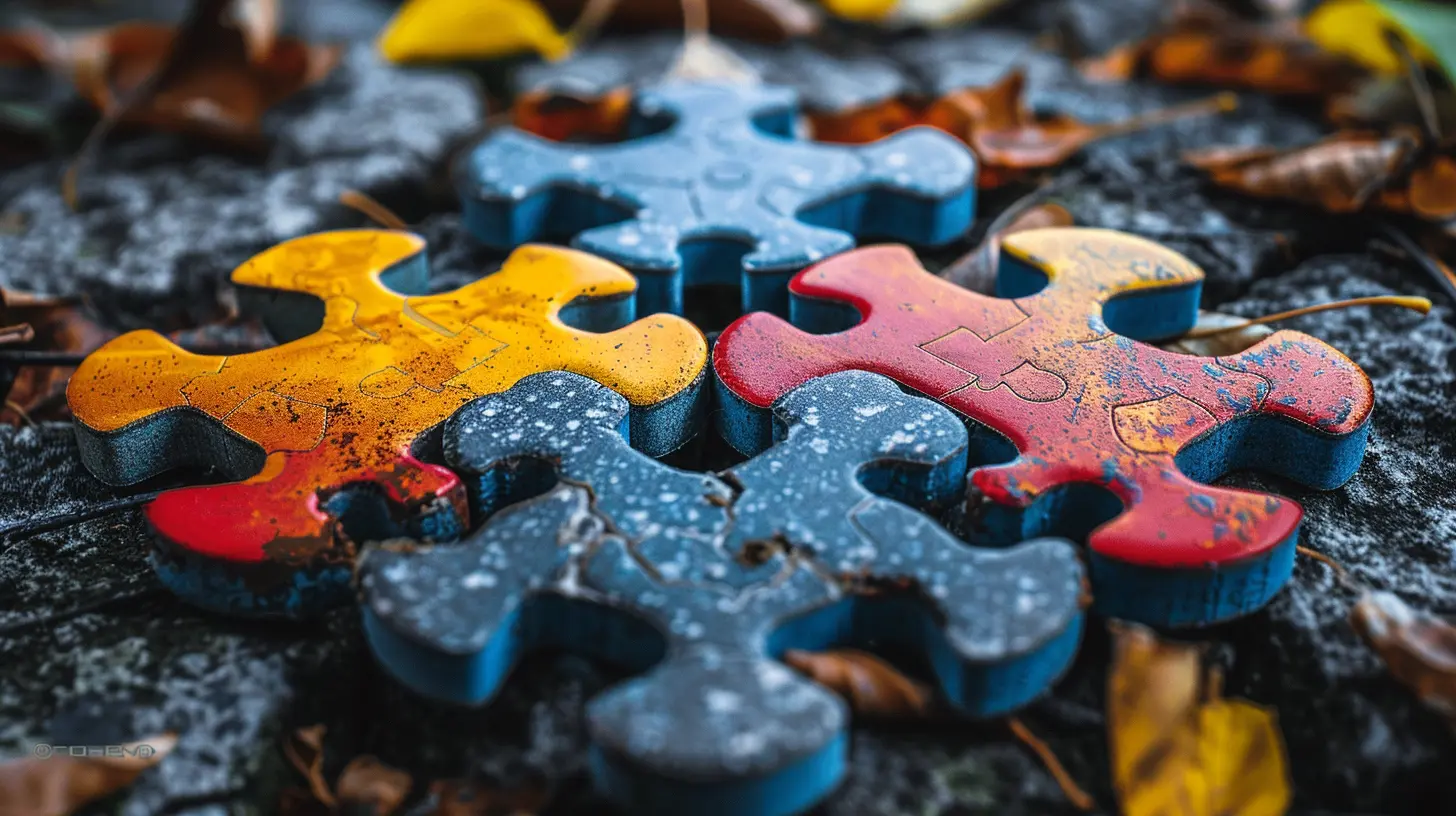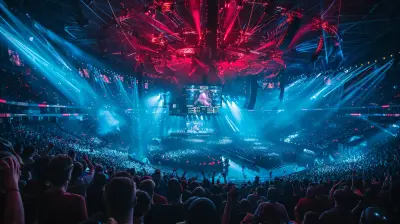Unlocking Success: How to Build Stronger Teams in Coop Games
15 August 2025
Let’s face it—there’s nothing as exhilarating as crushing objectives with your squad in a co-op game. Whether you’re slaying zombies, storming castles, or coordinating a stealthy heist, the magic of co-op gaming lies in teamwork. But let’s be real—not every session feels like a well-oiled machine. Some games feel more like trying to herd cats.
So, what separates the chaos from cohesion? How do some groups just click while others stumble over each other and end up rage-quitting? Welcome to your ultimate guide on unlocking success and building stronger teams in co-op games. Whether you're a die-hard gamer or just dipping your toes into the multiplayer world, you're going to want to keep reading.
Why Teamwork in Co-Op Games Matters So Much
Ever tried beating a co-op game solo? It’s like trying to juggle flaming swords while blindfolded. Co-op games are built on the foundation of collaboration. When you embrace the strengths of your team and rely on each other, the impossible becomes possible.But it’s not just about winning. Great teamwork enhances the entire experience. The laughter, the clutch moments, the high-fives (or rage emojis)—they’re all amplified when your team is in sync. It's the difference between playing a game and living an unforgettable adventure.
The Power of Communication: Your #1 Weapon
Let’s cut to the chase—communication is the lifeblood of any strong co-op team. If you’re not talking, you’re losing.Use Voice Chat (Seriously)
Using voice chat can be awkward at first, especially with strangers. But trust me, it’s a game-changer. Quick callouts, strategy planning, and even just goofing off in the quiet moments all build rapport and efficiency. It’s the virtual equivalent of passing notes in class—except you’re defusing bombs, not cheating on a math quiz.Be Clear and Concise
Keep your messages short and to the point. This isn't the time for Shakespearean speeches. "Enemy left," "need healing," or "flank now" are your bread and butter. Speak clearly, and if you’re in a chaotic moment, tone down the chatter to essential info only.Listen, Don't Just Talk
Many gamers get so caught up in giving commands that they forget to listen. Communication isn’t a one-way street. Create space for teammates to share their ideas and adapt to the changing flow of the game.
Know Your Role—and Embrace It
No one likes a teammate who tries to do everything—and ends up doing nothing well. That’s like trying to be the drummer, lead singer, and guitarist in a rock band all at once. Spoiler alert—it doesn’t work.Find Your Strength
Are you the tactical thinker? The aggressive brawler? The stealthy sniper? Every role matters. When everyone plays to their strengths, your team becomes unstoppable. Identify what you’re good at and make that your calling card.Respect Other Roles
Don’t try to outshine your healer or override your strategist. Appreciate what your teammates bring to the table. Your tank doesn’t need backseat driving, and your support doesn’t want to be left in the dust. Honor their contributions and watch the synergy unfold.
Practice Makes Perfect—So Don’t Skip It
If you’ve ever wiped a raid because someone didn’t know the mechanics, you know how painful it can be. Practice isn’t just for solo play. Team practice is where legends are born.Run Drills, Not Just Missions
Warm up by running easier missions or objectives. Use these to test new tactics, try unfamiliar gear, or switch roles. It builds confidence and helps identify weak spots before they matter.Learn From Every Loss
Don’t just rage-quit after a loss—analyze it. Where did the communication break down? What role could’ve done better? Every failure hides a lesson. Dig it out and grow from it.Build Trust Through Reliability
Wanna know the real cheat code for a strong co-op team? Trust. When your squad knows they can count on you, walls come down and cooperation soars.Show Up Consistently
If you promise to be on for a raid, be there. Flakiness kills momentum. When you’re reliable, your team will start counting on you—and that’s when real bonds form.Own Your Mistakes
Nobody plays perfectly 100% of the time. If you mess up, admit it. Say sorry, laugh it off, and do better next time. Owning your mistakes shows maturity, builds trust, and keeps the vibe positive.Adaptability: The X-Factor of Elite Teams
Even the best plans fall apart. A great co-op team doesn’t crumble under pressure—they pivot.Stay Calm Under Pressure
When the boss goes into rage mode or the enemy team flanks you out of nowhere, don’t panic. React, adapt, and bounce back. Calm heads win battles.Be Flexible with Roles and Tactics
Sometimes your squad’s healer can’t make it. Maybe your go-to strategy isn’t working anymore. The most successful teams are the most adaptable. Experiment, swap roles, and keep evolving.Celebrate the Wins (Yes, Even the Small Ones)
Nothing builds morale like celebrating victories. Whether you cleared a dungeon with no deaths or just nailed that tough puzzle, take time to enjoy it.Use Humor to Bond
Joke around. Share memes. Laugh about the time your friend fell off the map three times in five minutes. Humor strengthens connections and keeps your gaming sessions fun.Give Props Generously
If someone clutches the win, makes a slick play, or supports the team without fuss—give them a shoutout. Sincere praise makes everyone feel seen and drives them to play even better.Healthy Team Dynamics Start Outside the Game Too
Think co-op teams are only about gameplay? Think again. The strongest teams often build bonds outside of the game world.Stay Connected Off-Session
Join Discords, text in group chats, or share funny gaming clips. Keeping in touch outside of play sessions builds familiarity and trust that shows up in-game.Be Supportive, Not Toxic
We’re all human. People have bad days. Be kind, offer encouragement, and keep toxicity in check. A positive atmosphere keeps players coming back and strengthens your long-term teamwork.Pick the Right Game for Your Squad
Not every co-op game fits every team. Some games reward fast reflexes, others strategic planning. Some require deep commitment, others are more casual.Match the Game to Your Team Style
If your squad loves chaos and comedy, try games like Overcooked or Deep Rock Galactic. More into strategic coordination? Give Payday 2 or Rainbow Six Siege a go. The right co-op game magnifies your team’s strengths and keeps you coming back for more.Rotate Games, Keep It Fresh
Burnout is real. Switch it up now and then. Rotate between a few favorites to keep the fun alive and give everyone something to look forward to.Real Talk: Every Team Goes Through Growing Pains
Even the Avengers had disagreements. So it’s okay if your squad isn’t perfect from day one. You’ll have hiccups, rough games, maybe even some drama—but that’s all part of the ride.Don’t Compare Your Team to Others
You’re not trying to be the next esports sensation (unless you are, in which case—you got this!). Focus on your progress. Celebrate how far you’ve come, not how far you have to go.Stick With It
Rome wasn’t built in a day, and neither is a dream team. Keep showing up, learning together, and most importantly—having fun.Conclusion: Teamwork = The Ultimate Power-Up
If you take one thing away from this—it’s that strong communication, trust, adaptability, and mutual respect are the cornerstones of any successful co-op team. Master those, and you’re not just playing games; you’re building memories, friendships, and maybe even finding your lifelong gaming crew.Co-op games are about more than just winning. They’re about connection. They’re about those nights that turn into early mornings because you were "just gonna play one more match." So go ahead—invite your friends, pick your roles, sync your mics, and take on the world together.
Your next legendary mission awaits—and it’s always better with a team at your side.
all images in this post were generated using AI tools
Category:
Cooperative GamesAuthor:

Luke Baker
Discussion
rate this article
2 comments
Pandora McWain
Teamwork makes the dream work—unless someone insists on playing the healer with a vendetta!
December 30, 2025 at 5:52 PM

Luke Baker
Great point! Balancing roles and maintaining good communication are key to successful teamwork in co-op games.
Misty Pace
This article presents valuable insights on teamwork in coop games. Emphasizing communication and trust really resonates. It’s a reminder that success in gaming mirrors life’s collaborative challenges. Great read!
August 16, 2025 at 4:10 PM

Luke Baker
Thank you for your insightful feedback! I’m glad the emphasis on communication and trust resonated with you. Collaboration truly is key in both gaming and life.


